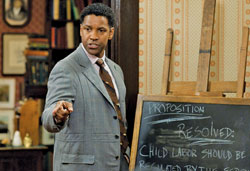“Great Debaters” Not So Great

David Ginn, who last wrote for lemonwade about “Things We Lost in the Fire,” here contributes commentary about this movie set to open Christmas Day:
I really wanted to like “The Great Debaters,” a new film directed by and starring Denzel Washington (pictured). When I first heard about it, I was excited and thought it was a story that needed to be told. When I became aware of the cast and the star power behind it (Oprah Winfrey is the executive producer), I just knew that it would be a hit with me. The cast also includes Forrest Whitaker, Kimberly Elise, Jurnee Smollett, and newcomers Denzel Whitaker (Forrest’s son) and Nate Parker. Set in rural Texas in the early 1930’s, Washington stars as politically progressive teacher, at Wiley College, who uses words to inspire and mobilize those around him. He forms a debate team to compete with other black colleges and universities, and ultimately with the top-ranked Harvard University squad.
But within 15 minutes, I knew that I was going to leave feeling disappointed. Not because of the quality of the film or of the performances, but because I have seen this movie before. If you remove “debate team†and insert “swim teamâ€, it was last year’s “Pride†starring Terrence Howard. Or insert “footballâ€, and you have “Remember the Titans.†We all love and appreciate an underdog story, and we feel better about ourselves when rooting for the “little guy.†The problem is that we know how, in Hollywood, the underdog story ends. And when it comes to black American history, specifically before the Vietnam War, we know how this sequence of events plays out. Someone will be called a “nigger,” there will be a lynching, and an opportunity will be given – usually by a liberal white person — to a lucky young black character to triumph. “The Great Debaters†is no different.
I hesitate to call this movie unoriginal, because it involves an untold story. Nothing new is learned, however, once you hear the film is about a black debate team in rural Texas in the 1930s. Even though the movie is based on a true story, the climax to the movie is unbelievable, primarily because the actors were. Denzel Whitaker is adorable and Jurnee Smollett is very sexy (even with a horribly inconsistent accent– curiously enough, only the women have accents) but it’s hard to accept them as debaters strong enough to defeat the Harvard team. Is this an inevitable consequence of doing an African-American period piece? Are we even in a position as a society to find the beauty in such a turbulent time in our history, or do films of this genre just re-open old wounds? It would be more interesting if “The Great Debaters†were about a contemporary black college debate team. If nothing else, this movie serves as a reminder that you can be young and black and deliver an eloquent and poignant message without a phat beat behind you.
